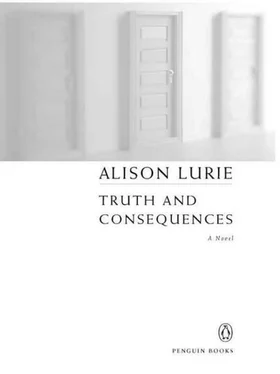“It’s been moved upstairs temporarily,” Jane said, thinking that she should have known this question would be asked. Alterations in the structure or furnishings of the mansion always concerned and often annoyed Lily Unger. “One of the Fellows has migraine headaches, she needs to lie down sometimes.”
“You mean Delia Delaney.”
“Umhm.”
“It would have to be her. From what I’ve seen of Selma Schmidt, she never lies down. Wound up tight, like a clock spring.” Lily Unger always took an interest in the current year’s Fellows. If she liked them, she sometimes invited them to lunch and even attempted to read their books. “She looks frustrated. Not married, is she?”
“No.” Jane neglected to add that Selma was a lesbian feminist, two words that had formerly aroused Lily Unger to rage.
“I’m not surprised. Most men like a wife to be more restful.” Mrs. Unger smiled. It was clear that in her time she had been able to be, or at least to appear, restful. “Delia Delaney’s married, though.”
“Oh yes.”
“Been married three times, I hear.”
“I don’t think it’s that many,” Jane said. “Two, maybe.”
“Three.” Mrs. Unger spoke with authority.
“Really? Where did you hear that?” Lily Unger sometimes proffered information of this sort, which often later turned out to be correct.
“Oh, here and there.” It was typical of Lily not to reveal her sources. “I’ve got nothing against it, if she can stand the strain. This current one is good-looking, anyhow. But I’m afraid he’s a tame man.”
“Really.” Jane’s conscious opinion of Henry was not wholly favorable, but this statement annoyed her. “How do you mean?”
“You know, like those tigers in the circus. You often see women who look like Delia there. Same hair, same sort of figure. It’s amazing what they can do with a whip and a little gilt chair. But of course it’s not so easy to tame something that size. Eventually those beasts can rebel and maul you, I saw it happen once—” Lily broke off as, from overhead there came a sound somewhere between a squeak and a scream. “Heavens, what was that?”
“I don’t know.” For a moment, Jane’s mind remained occupied by a vision of Henry Hull transformed into a tiger and snarling on a stool in a circus ring, with Delia Delaney, in spangles and tights, cracking a whip at him.
“Jane, I have to talk to you!” Susie cried, rushing into the Emerson Room; her face was damp and flushed.
“Yes, what is it?” Jane lowered her voice; but Lily Unger, exercising her self-assumed proprietary privileges, followed them into the hall.
“It’s that Professor Amir,” Susie gasped, choking back a sob. “He sort of just grabbed me.”
“Oh, I’m sorry. That’s awful. Where did he grab you?”
“Right there in his office. I brought him the letterhead, like you told me, and he said could I put it on his desk, and so I did, and he said something in a funny language, and then he sort of grabbed me and kissed me.” Susie indicated a blur of pink lipstick around her mouth and began to cry.
“I’m so sorry,” Jane repeated.
“I never did feel comfortable around him from the start,” Susie gasped. “He always looks so sort of sad and starving.”
“I know what you mean,” Jane admitted. It was true that Professor Charlie Amir had a hungry look. His wife had gone back to Europe to visit her family, so that he was alone in Corinth for the time being, and Jane had sometimes wondered if he was getting enough to eat. “Don’t worry, he won’t bother you again. We’ll talk to him.”
“I can’t talk to him,” Susie said with a sob.
“You don’t have to. I’ll do it, and if that doesn’t work, Bill Laird will. We’ll tell him that if he tries anything like that again he’ll be really sorry. Now why don’t you go and wash your face, and then maybe you could type up a report of what happened, just like you told me. After that you can go home, if you like.”
“No thanks,” Susie choked down a final sob. “I feel better now.”
“It was that skinny one with the beard, wasn’t it?” Lily Unger said after Susie had gone. “Comes from somewhere in Eastern Europe, doesn’t he? They aren’t brought up to respect women over there, not like here in America.”
“I’m sure some of them are,” Jane said.
“But this one wasn’t.”
“No, I guess not.” Jane frowned as she began to consider the possible consequences of this fact.
“Of course you have to speak to him,” Lily Unger continued. “But I do think there’s too much fuss made about this so-called sexual harassment these days. When I was first working, back in the forties, there were guys like that in every office. It was an occupational hazard, sure, but nobody got hysterical about it. When you first started the job the other girls warned you. ‘Don’t go into Mr. Smithers’s office alone,’ I remember Margie, the office manager, telling me on my first day at the bank. ‘He can’t keep his hands to himself. Make some excuse if you can, and if you can’t, stay on the other side of the desk,’ that’s what she told me. ‘And if he tries anything, scream.’ Creeps like that, they’re not going to rape anyone. They don’t want to cause a commotion, all they want is to cop a feel. A little noise and they back off.”
“I hope so,” Jane said. “I guess I’d better go talk to him now, if you’ll excuse me.”
“Would you like me to come too?”
“No thanks,” Jane said, though at the same time it occurred to her that Mrs. Unger’s disapproval might be more effective than her own. “Not yet, anyhow.”
“Well, just let me know if I can help,” Lily Unger said, giving Jane a disappointed glance as she left the room and headed toward the stairs.
In the upstairs hall Jane hesitated, looking toward Charlie Amir’s office and trying to plan what she would say. Charlie was the youngest Fellow, only in his early thirties, but he had already distinguished himself as an economist. Born in Bosnia, he had somehow managed to attend London University, and his growing reputation had won him fellowships to Oxford and a tenure-track appointment at the University of Ohio. His current interest was in the economics of the Catholic Church, and he was writing a book about the church as a landowner in Central Europe, from a Marxist revisionist point of view.
In person Charlie seemed pleasant and rather shy, but two letters of recommendation had called him brilliant, which meant that his mind probably worked faster than hers did. Jane told herself that she must speak slowly and not make any mistakes, in case the matter ended up in the office of the University ombudsman, an apparently neutral but frighteningly powerful person. But what should she say?
She looked toward the door of Alan’s office, which was shut. But he was there, she knew: she could tell him what had happened, and receive his sympathy and advice. As a former department chairman he had dealt with similar cases. But two things stopped her: first, the closed door, which in their private code meant that the person inside could only be disturbed in an emergency; and second, the fact that since he had developed back trouble her husband did not always seem able to offer either sympathy or advice.
Well, but this was an emergency, sort of, Jane told herself. Approaching Alan’s door, she knocked lightly. When there was no answer she quietly turned the handle. There was nobody at the desk, but something like a bundle of clothes with wires coming out of it lay on the sofa. It was Alan, she realized, curled in a semi-fetal position with his back to her. Wires were running out of his ears and attached to a tape-playing device. Another set of wires ran from his lower back to a black electronic box that was supposed to block pain signals. In the last few months since he got this box Alan had spent more and more time like this, lying on a bed or a sofa and listening to music or to books on tape. When interrupted he was always disoriented and sometimes irritated.
Читать дальше







![Кэмерон Доки - Правда и ее последствия[Truth and Consequences]](/books/79610/kemeron-doki-pravda-i-ee-posledstviya-truth-and-con-thumb.webp)




